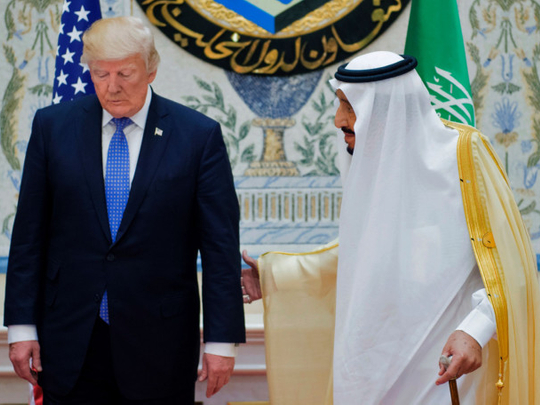
It is in Saudi Arabia that Trump aimed to build stronger partnerships, said the Saudi Gazette. “Trump’s objectives included restoring trust between the US and its long-standing partners in the Middle East and unveiling a new administration that is expressing itself differently on Middle East issues. The US must stay engaged in the Middle East. Trump’s visit shows that he will not walk away from the region, no matter how daunting its challenges. Establishing personal rapport and trust with the leaders of the region is a necessary first step, but it should not be the end goal. When the US and its allies finally defeat Daesh [the self-proclaimed Islamic State of Iraq and the Levant], as Trump has promised, the work must continue to help keep the dark forces of chaos at bay. No matter how warm the visit, how genial the relationships, cordiality cannot alone resolve the daunting demographic, social, economic and political challenges Middle Eastern countries face.”
The message emanating from the summits held in Riyadh over the past few days — echoed by Trump in his speech on Sunday — was that Iran, Hezbollah and their regional allies are sponsors of terror, said Lebanon’s Daily Star. “Now the ball is in the accused’s court, and the coming days should show us how Iran and Hezbollah wish to respond. Iran has in recent days been promoting its own message, one of tolerance and engagement in the wake of Iranian President Hassan Rouhani’s resounding election win. But though he may carry a message of peace, in Iran, true power often lies elsewhere, and results will be seen on the ground, such as in Iran and Yemen, rather than post-election speeches. For Hezbollah, it is time the party heeded the warnings coming from its Arab neighbours and their US ally. When so many countries and powers converge to condemn Hezbollah’s actions outside Lebanon, the party should certainly reconsider its behaviour.”
The summit conveyed a clear change in the direction taken by the US administration, particularly if one were to compare Trump as a candidate running for the presidential elections and President Trump, said the London-based Pan-Arab paper Al Quds Al Arabi. “The change is clear to see, with the reasons being that the recent summits and their results, in addition to Trump’s speeches during those events, showed that his stand is generally close to that of Saudi Arabia and the Arab world when it comes to issues of terrorism, Iran, Syria and Yemen. Most political analyses have also spoken about how the steps taken by Washington are gradually drawing closer to those of Riyadh. Earlier, Trump stuck by his anti-Muslim slogans and issued resolutions against Muslims too. The Gulf countries, however, resorted to their cool and calm policies and ignored Trump’s attacks on Islam.”
The map of the region’s stability will, in the future, be described in terms of ‘pre-Riyadh summit’ and ‘post-Riyadh summit’, said the London-based Pan-Arab paper Asharq Al Awsat. “Perhaps altering the official American mentality about its interests and limits of its meddling in the affairs of the region will be marked as a victory in its favour. US President Donald Trump has clearly indicated this in Riyadh by stressing that his country does not want to dictate to the people how to lead their lives.”





_resources1_16a31069e4e_small.jpg)






